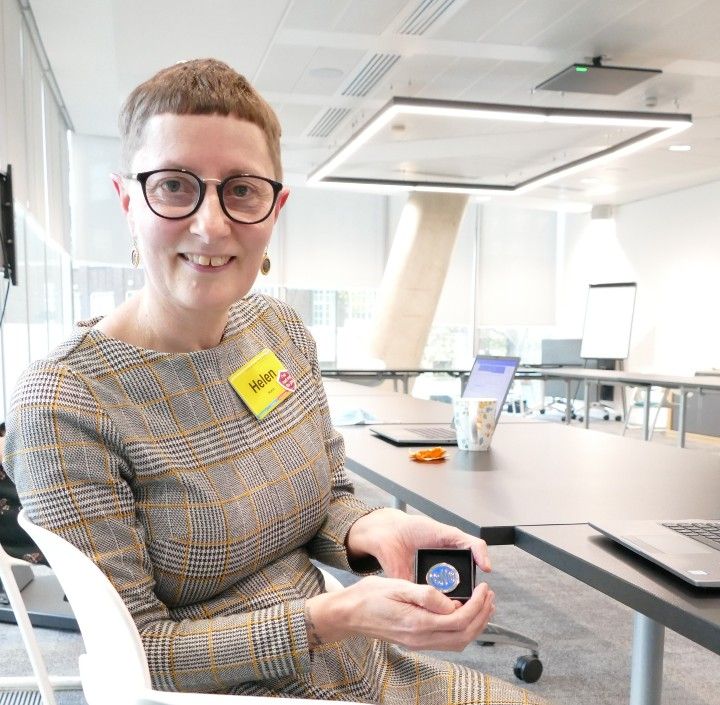Posted on: 8 December 2020

Three senior CNWL nurses were today lost for words when they received Chief Nursing Officer Silver Awards from England’s Chief Nursing Officer, Ruth May, for their work during the Covid pandemic.
Helen Willetts, Director of Nursing Goodall Division and also CNWL’s Director of Infection Prevention and Control, Luxmi Dhoonmoon, Nurse Consultant – Tissue Viability and Lisa Basi, Head of Integrated Primary Care all played vital roles towards patient care.
They were all caught by surprise when Ruth May appeared o n their Zoom meeting for CNWL’s Professional Nursing Council meeting. It had been arranged by CNWL’s Chief Nurse, Maria O’Brien who had nominated the trio.
n their Zoom meeting for CNWL’s Professional Nursing Council meeting. It had been arranged by CNWL’s Chief Nurse, Maria O’Brien who had nominated the trio.
The award they received today recognises these major contributions and is a personal award from England’s Chief Nursing Officer in gratitude for their valuable work as nurses.
Ruth said: “Here we are on V-Day, but it was only 10 months ago that the NHS was caring for the first Covid patient. We’ve been through such a challenging year and it’s been the toughest that many of us, if not all of us, have been through in our professional career.
“But this is also one of my most proud moments when I see nurses really step up and be amazingly flexible in their approach – stepping out of their comfort zone into areas they’ve not been in before or not been in for a long time.
“I would like to take this opportunity to say thank you individually and collectively. These have been tough times and it’s been great to see the huge support they’ve had from the public and I wanted to lend my support.
“When I became CNO on a freezing morning on January 7, 2019, I launched my awards as a personal thank you. They are a thank you from me for all the work you’ve done above and beyond and today, I want to give senior silver awards to three people from CNWL, Helen Willetts, Luxmi Dhoonmoon and Lisa Basi.
“As Chief Nursing Officer for England, I wanted to show my personal appreciation for what you’ve all done and my personal thank you for the leadership you’ve demonstrated.”
Part of Helen’s citation states: “As a newly appointed DIPC, Helen was faced with leading the Trust’s IPC response to the Covid-pandemic within her first month…
“Being new to post and with the pandemic starting, she has given 110% to ensure safe clinical practice to protect our patients and staff. She has overseen a number of key Trust IPC work streams, leading from the front to provide a responsive and supportive role to our 7,500 staff…
“I know that this has been the most challenging time in her 35-year career – really pushing her clinical skills to the limit - but has equally been the most rewarding and proud time for her being a nurse in the NHS.”
Part of Luxmi’s citation reads: “Luxmi’s role was initially geographically based but she has voluntarily extended her expertise to support the whole Trust particularly supporting colleagues with complex patients needing expert input. She has also established close working relationships with our mental health inpatient units, provide regular wound care support and really bringing together effective a holistic approach for physical healthcare for all mental health patients.
“Luxmi’s response to Covid was prompt with redeployment of her staff to core services, taking on responsibility of patients on District Nurse caseloads with complex wounds, and has already undertaken a deep dive into the impact of Covid on deep tissue injuries. She also publishes articles and co-publishes her work in wound care with peers in the field.”
Part of Lisa’s reads: “Lisa Basi has made a fundamental difference to our organisation’s ability to respond to the Covid-19 pandemic in community services. Establishing integrated relationships with acute and social care partners across North Central London to be able to offer infection prevention and control training, PPE training and swabbing support across multiple organisations. She led the community-based programme for patient swabbing; establishing processes, procedures and identifying and training staff.
“She has trained and supported countless health and social care staff and by undertaking direct clinical care herself, over and above her nursing operational leadership role, from the beginning of the pandemic and until this point with considerable dedication and unflagging commitment. Without a doubt she has gone over and above her day to day role to make a massive and sustained difference to clinical practice and our patient population.”